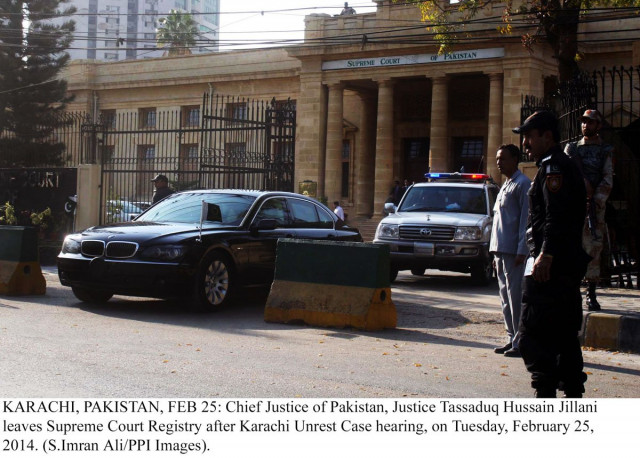Cases of 66 senior cops forwarded for action
IG informs SC about action taken against police officers with patchy records

Deadline: 1 month is the time that the apex court has given to the district South sessions judge to submit a report on the allegations that Malir SSP Rao Anwar demanded ransom for the release of the student killed in a ‘fake’ encounter. PHOTO: PPI
This was disclosed in a report filed with a two-judge bench during the suo motu proceedings regarding action against the police officers having patchy service records. Comprising, Justice Faisal Arab and Justice Sajjad Ali Shah, the bench was hearing the matter at the SC's Karachi Registry.
In the report, IG Khawaja informed the court that action had been taken against 12,000 officers and officials who had patchy service records. He said it was recommended to the competent authority to take action against 66 senior police officers over the allegations of their involvement in corrupt practices, negligence from duties and offences.
SC seeks master plan of Karachi
The report said that out of the 66 senior police officers with patchy records, 35 were working in BPS-18 to BPS-21, while 31 were working in BPS-17.
The police chief informed that 184 officers working in BPS-16 and below had also been penalised through departmental proceedings according to the law.
Hearing on appeals
In the meantime, the same bench directed the provincial advocate-general (AG) and other lawyers to make arguments on the appeals filed by suspended police officers as well as the provincial government against the Sindh Services Tribunal's orders regarding suspension and reinstatement of the police officials and officers for having patchy service records. The matter will be taken up in the fourth week of January, 2018.
SC orders inquiry into Mehmoodabad treatment plant's land allotment
A number of the suspended police officers had approached the apex court against the decisions of the Sindh Services Tribunal.
They alleged that the competent authority had ordered their removal from service following inquiries initiated on the recommendations of an SC-appointment inquiry committee probing into the allegations of their involvement in criminal activities.
The petitioners argued that the inquiry committee, headed by AIG Sanaullah Abbasi, had taken discriminatory action against them by removing them from service to save other officers, who were favourites of the committee members.
‘If the KDA DG’s salary is stopped, he will wake up’
They alleged that the committee had not recommended any action against other police officers as they were their favourites. Therefore, the removed officers pleaded to the apex court to declare that the action taken against them was illegal and based on discrimination.
On the other hand, the provincial government also moved appeals against the decisions passed by the Sindh Services Tribunal in cases of some police officers who were proceeded against for their patchy service records but the tribunal ordered their reinstatement. The government pleaded to the court to set aside the service tribunal's orders for the police officers' reinstatement.
Justice Shah observed that it did not appear that the committee had acted against the police officers on the basis of nepotism. "There are at least 50 cases each against [every] officer [who was dismissed]," he remarked.
Govt has two months to act against ‘patchy’ cops
However, the bench members made it clear that the cases of only those petitioners, who had been punished twice, will be heard and decided. It directed the Sindh AG and petitioners' lawyers to argue on the matter in the fourth week of January.



















COMMENTS
Comments are moderated and generally will be posted if they are on-topic and not abusive.
For more information, please see our Comments FAQ